On this page:
Foreword
The Resilient Families Program in South Australia has been in place for two years having commenced at our Melrose Park office in July 2021 and then moving into Murray Bridge in 2023. The program is based on our well-evidenced Resilience Practice Framework, which was developed by The Benevolent Society 10 years ago and is the foundational framework for our work in Family Preservation in New South Wales, Queensland, and South Australia. The program has reached a high success factor of family preservation to date and this is due to a combination of the practice frameworks robustness; the respectful and collaborative relationship between The Benevolent Society and our Department for Child Protection colleagues, and the quality of the service provision by our staff. We welcome the South Australian and Commonwealth Governments’ commitment to this work and, as this annual report will attest, the difference that this program makes to vulnerable South Australians lives on a daily basis.
Josie Kitch, Director Operations – South Australia (Disability and Child and Family), The Benevolent Society
The Resilient Families program is an excellent partnership between the South Australian Government and The Benevolent Society for the provision of intensive family support services focused on the safety and wellbeing of at-risk children. The program’s unique social impact investment model provides us with an opportunity to closely collaborate between all parties and further build the evidence base for early intervention services in South Australia. We are grateful to The Benevolent Society for their ongoing commitment to deliver high quality services.
As part of our ongoing efforts to implement a trauma-informed family support system, The Benevolent Society is sharing and increasing their individual and collective knowledge about principles and practices that provide a trauma-responsive approach to engagement, reflection, and family functioning. This will further support our efforts to learn and understand how best to deliver trauma-informed services to children and their families.
Dr Henry Pharo, Director, Early Intervention Research Directorate, Department of Human Services
Department for Child Protection continues to support the Resilient Families Program in working towards improved social outcomes for vulnerable families and their children.
The collaborative cross-agency process provides the opportunity for Department for Child Protection, other government agencies and service providers to work together to strengthen family functioning and to create safer home environments for children and young people.
Early investment and support towards family preservation is critical in addressing long term challenges aligned to social disadvantage. The Resilient Families Program uses integrated solutions to support families to stay together and to prevent children and young people from entering care.
Department for Child Protection look forward to continuing to work in partnership to safeguard families and children in South Australia.
Kitty McLean, Director, Quality and Practice, Department for Child Protection
Resilient Families continues to demonstrate what can be achieved by bringing together federal and state governments with service providers to deliver collaborative projects to tackle entrenched social disadvantage. Early investment in family preservation can have long-term implications for future welfare costs. Resilient Families is an example of a strong program providing support and intervention to keep families together while also improving long-term outcomes in areas such as education and employment.
Social Impact Investing Unit, Department of Social Services
Program overview
Resilient Families Program
Resilient Families (RF) is an evidence-informed, therapeutic service that delivers outcomes for vulnerable children through intensive, long-term, in-home support. RF takes a whole-of-family approach to building safety, resilience, and stability for families where the presence of risk factors indicates the need for intervention to reduce risk and prevent harm to the child or young person. Families that meet the program eligibility criteria and have been assessed as requiring intensive support are referred to the program by Department for Child Protection (DCP).
For the first 12 weeks of a family’s engagement with RF, they have access to 4 to 6 hours of in-home support per week, with 24/7 support available as required. As safety increases, risks decrease, and family resilience is built. Support then tapers to a less intensive model (2 to 4 hours per week) for up to 12 months. During this support period, the full range of challenges faced by families is addressed, including, substance misuse, domestic and family violence and mental health issues. The focus remains on child safety and family resilience, with positive engagement facilitated by intensive face-to-face contact to drive sustainable results.
Over time, the counterparties (The Benevolent Society, Department of Human Services, The Department for Child Protection) will explore the feasibility of Department of Human Services’ Child and Family Support System Pathways Service (centralised referral management for intensive family services) to refer to the Resilient Families program.
The South Australian Government, (through Department of Human Services) engaged The Benevolent Society to deliver its Resilient Families program in accordance with the terms set out in the Resilient Families Social Impact Investment Program Deed dated 21 January 2021 to 30 June 2027 between the Minister for Human Services and The Benevolent Society.
Figure 1 Program Timeline: presents the implementation timeline for Resilient Families
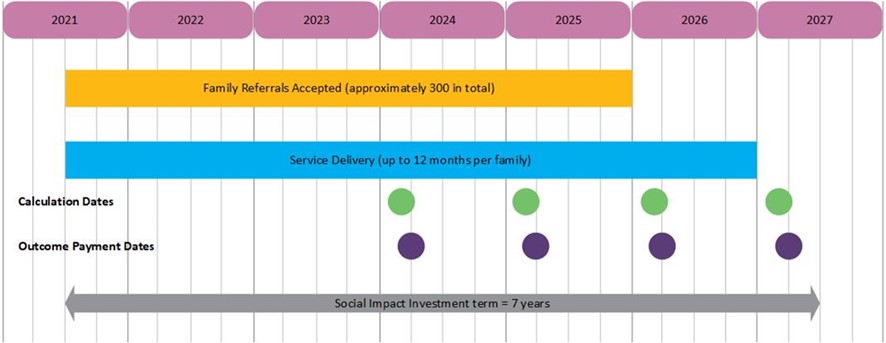
Social impact investment
In South Australia, Resilient Families (RF) is a social impact investment, transacted as a ‘pay by results’ contract. The counterparties (The Benevolent Society, Department of Human Services, Department for Child Protection) share contract management, and have agreed to work together to achieve a shared outcome, of preservation within the family home (and in community and culture) of a child under 9 years of age (including unborn children) or, where they might otherwise be removed and placed in care.
Government and not-for-profit organisations collaborate in social impact investments to test innovative solutions to public policy challenges, such as the growth of children and young people in care. Social impact investments prioritise robust measurement, typically combining government administrative data and repeated program level wellbeing measures. Social impact investments are underpinned by 4 core principles:
- Prevention: shifting the focus from high-cost acute services to prevention.
- Innovation: demonstrating additionality and building an evidence base of
‘what works’. - Partnerships: leveraging the strengths of different sectors and sharing risks
and rewards. - Outcomes: designing for measuring, and rewarding delivery of outcomes.
‘Pay by results’ contracts combine ‘traditional’ contract payments with additional payments for higher levels of performance, when achieving greater than expected results. In addition to a contracted outcome, the other distinctive feature of a ‘pay by results’ contract is that the South Australian government’s counterparty (The Benevolent Society) has agreed to bear some financial risk if the outcomes fall below an agreed rate. To maximise transparency, this expected outcomes rate is specified in the contract. Equally, The Benevolent Society, as the counterparty to a ‘pay by results’ contract receives a financial return should the outcomes be greater than the expected rate. In Resilient Families, this is defined as preservation of children in their homes at a greater rate than expected.
South Australian and Commonwealth Governments
Resilient Families (RF) is a joint project between the South Australian and Commonwealth Governments, via the Project Agreement for Commonwealth State Social Impact Investments, Intergovernmental Agreement on Federal Financial Relations. Both governments have a common concern in improved outcomes for families with children at imminent risk of removal. Both governments agree to share data and analyses to assess the impact of Resilient Families, and to collaborate in evaluation.
Outcomes payments
The first calculation date will occur in February 2024, which will consider the outcome of families in the intervention group 12 months after their commencement in the program. This will reflect children who entered the intervention group in the first six quarters of the program’s operation (from July 2021 to December 2022). The first calculated outcome will be reported on in the 2023–24 Annual Report.
Service model
The RF Service Model is based on evidence provided by:
- the evaluation of the Resilient Families (Social Benefit Bond) pilot
- the Resilience Practice Framework (RPF)
- Evidence Informed Practices (EIPs).
The Benevolent Society, in partnership with the Parenting Research Centre, has developed 42 EIPs, of which, RF practitioners draw on the following practice guides in their work with families:
- increasing safety
- secure and stable relationships
- increasing coping and self-regulation
- improving empathy
- increasing self-efficacy
- practitioner skill
- cumulative harm
- infants at risk of abuse and neglect.
The efficiency and effectiveness of service is measured by the evaluation of:
- supporting parents to create a safe, stable, nurturing family environment
- improving children’s wellbeing
- improving parenting skills and capacity, family functioning and relationships in a sustainable way
- preventing children from entering care unnecessarily and assisting with restorations.
Child and family support system context
In recent years, Department of Human Services (DHS) has been working closely with government and non-government partners to collaboratively grow a new Child and Family Support System (CFSS) that is able to work with families earlier to prevent harm to children, family vulnerability and trauma.
The reform of the CFSS is a key element of the whole-of-government reform of the state’s child protection system – Safe and well: supporting families protecting children –and aligns with the Department for Child Protection Strategic Plan 2022–2026 (‘the Plan’). The Resilient Families program directly aligns to one of the core priorities of the Plan—Active and Collaborative Partnerships: We work together with our service partners and alongside the community to improve outcomes for children, young people, carers, and families.
The DHS Roadmap for reforming the Child and Family Support System 2021 to 2023 outlines the steps to improve early intervention services for children and families with complex needs. The CFSS is made up of a range of services and programs delivered by government and non-government organisations. These services are able to respond to different degrees of complexity and safety concerns of children and families. These services span from community capacity building through to intensive case management.
Within the CFSS, DHS funds and delivers three tiers of family preservation programs that have varying degrees of intensity:
- Tier 1: Out-of-home care prevention programs and disrupting intergenerational disadvantage
- Tier 2: Intensive family services
- Tier 3: Family support services.
This service system is depicted in Figure 2: Child and Family Support System Overview. Resilient Families sits within Tier 1 on this spectrum and works with families at imminent risk of having their children placed in care.
Figure 2 Child and Family Support System Overview
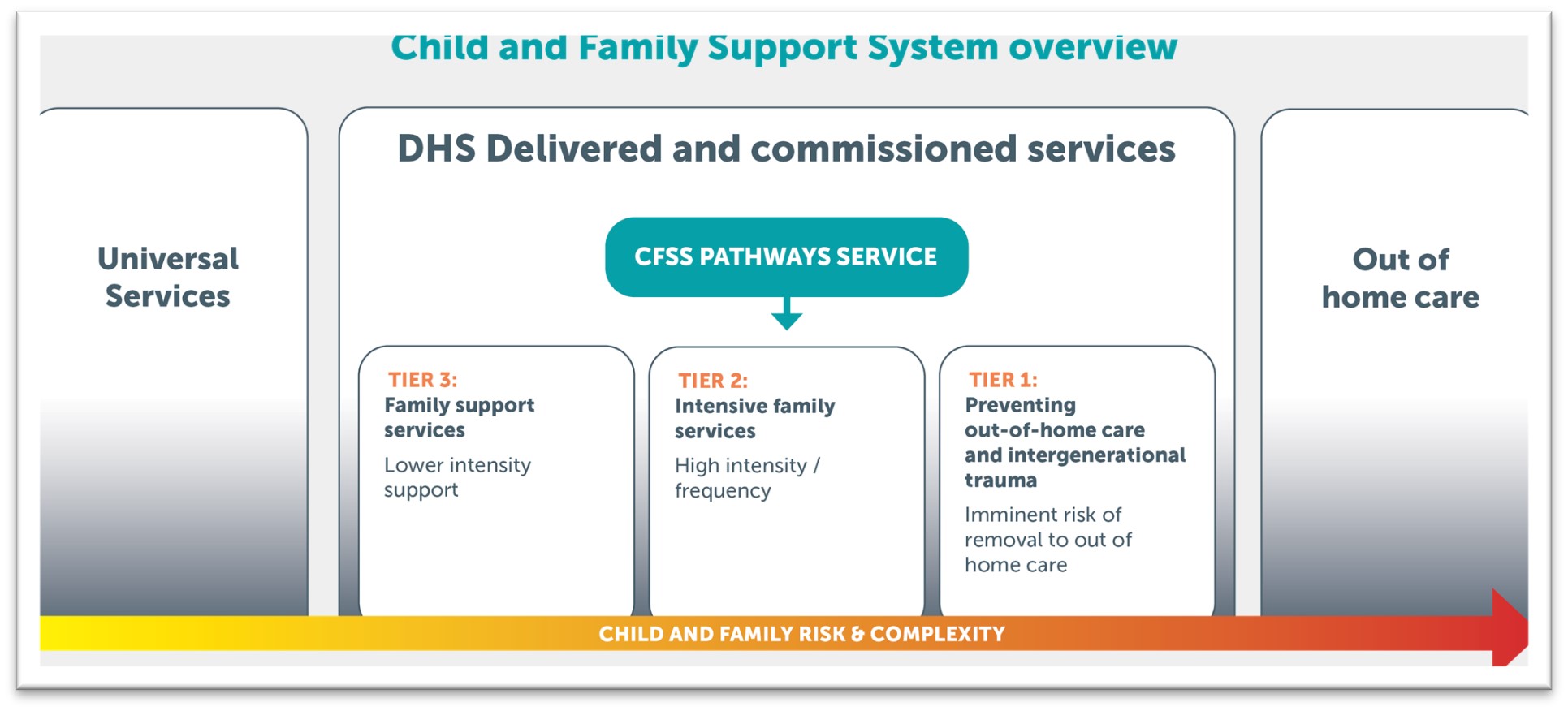
Children, young people, and families face varying levels of complexity, which changes at different stages throughout the life course of a child, young person, or family. Services within CFSS sit across a spectrum of complex needs and safety risks experienced by children, young people, and families. A child, young person, or family can move across the continuum as their circumstances change to receive the right service at the right time to address their needs.
Child protection and support services reviews and findings
Our child protection and family support services exist to protect the most vulnerable members of our community and are subject to regular internal and external reviews. Of particular note, the ‘Trust in Culture’ report by Kate Alexander, and the review by former Police Commissioner Mal Hyde, both presented in 2022, identified the need for strengthened multi-agency, earlier intervention approaches when responding to safety concerns for children, young people and families. The Benevolent Society works closely with Department for Child Protection to identify families appropriate for Resilient Families intervention and to engage the family into the program. Their contributions to epidemiological data continue to inform the evaluation of the CFSS.
Program development and learnings
Governance
Two governance groups support the implementation of Resilient Families (RF):
- The Resilient Families Operational Group includes The Benevolent Society (TBS), Department for Child Protection (DCP) and Department of Human Services (DHS) leaders directly involved in the referral process and program management activities. The operational group meets monthly to discuss and resolve initial issues and risks in a timely manner.
- The Resilient Families Joint Working Group comprises executive leadership across all program partners (TBS, DCP, DHS, Department of Treasury and Finance, Commonwealth Department of Social Services (DSS)), to consider the progress of the program from a strategic lens. This group considers challenges and potential solutions to the referral process, as well as opportunities for connection with other Child and Family Support System reform activities and DSS-led initiatives. As the program has settled, this group now meets quarterly to review the activities of the previous period.
Referral partnerships
DCP Murray Bridge accommodated The Benevolent Society RF worker for several months whilst building works were completed. This allowed services to commence for families in the Murray Bridge area and rapidly developed the relationship with the local team to understand the RF program and service options to complement support provided.
Relationships between TBS and DCP staff continue to grow, with a deeper understanding of the Resilient Families service model, and demonstration of appreciation for the work being undertaken.
TBS and DCP have increased their communication about potential capacity, with TBS informing the DCP program manager about expected opportunities for referrals prior to a formal request. This allows for greater planning time at each DCP office to identify appropriate families and undertake the necessary investigation activities, or consider alternate services if capacity is not available.
A review of Department for Child Protection (DCP) office boundaries and changes to some office structures to ensure a more consistent approach to the delivery of DCP child protection services across the state was successfully implemented in April 2023. The changes included an expansion of services for the inner south office who now offer the full range of DCP services, including, investigation and assessment, family preservation, reunification and case management, for children and young people under the guardianship of the chief executive. Referrals from the inner south office commenced from May 2023.
Brokerage support
The Resilient Families (RF) Service Model provides for a substantial amount of brokerage funding, which can be used to assist families throughout service provision. For many of the families in RF this has been used to provide waste removal and domestic cleaning support during service engagement, which has an immediate impact of the safety and wellbeing of the children. Practitioners have also been able to use brokerage funding to access assessments and health support for child and adult family members, especially to apply for the National Disability Insurance Scheme (NDIS) support. Having a diagnosis and access to services improves the wellbeing of participants within RF and provides greater opportunities for support at school for the applicable children. Practitioners have also been able to assist in achieving independence and safety for some families with the assistance of brokerage to pay for drivers licence and lessons. The Benevolent Society have also been able to support families to enjoy activities and create memories during school holidays, which is often financially unachievable for many of the participants. Having these memories and reduced pressure of the financial burden for the day has a very positive impact on the families and allows them to connect with each other away from the pressures often faced at home.
Workforce
Resilient Families is staffed by:
- 1 manager
- 2 team leaders
- 8 child and family practitioners
- 1 cultural engagement practitioner (0.4FTE).
Staffing throughout the reporting period has remained relatively stable, however, a change in team leaders during this period occurred. Resilient Families (RF) has been able to fill any vacancies with skilled, qualified staff. The Murray Bridge position became vacant this period and The Benevolent Society (TBS) was able to attract a local staff member to the position, supporting our engagement and connection to the community. Currently TBS has an excellent team of staff. The expansion of TBS disability services into the Murraylands will continue to have an impact on the outcomes for families within the region and enable RF families to access seamless supports from disability services and colleagues as required.
Financial statement
TBS delivered RF within the allocated budget. Set-up funds were approved for roll over for the life of the contract.
Child protection awards
TBS was nominated by Department of Human Services (DHS) for a child protection award in 2022 under the Outstanding Service Award category. The nomination recognised the program’s successful first year, with only one family having a child placed in care1 but later returned to the family home. TBS’s work with families to assist with the National Disability Insurance Scheme (NDIS) assessment and application process was highlighted in the nomination, to acknowledge how a diagnosis and engagement of relevant supports can reduce the stress experienced by families participating in the Resilient Families program, with a positive impact on other complexities within their family unit.
1 Referred to as Out of Home Care (OOHC) in the Operations Manual and Deed
Intervention group 1 July 2022 to 30 June 2023
Families were referred to Resilient Families (RF) across the 12 months, based on the cohort size identified in the contract. Generally, the referrals were distributed across the months in line with capacity of case workers to commence working with new families. In the second year of the program, referrals were sought across all eligible areas with the increased capacity of the Murray Bridge service.
The below tables and graphs summarise the distribution of referrals across the quarter, the referring office, status at the end of the 12-month period, and age groups of all children engaged in the RF program.
Referrals and commencements
The cumulative total of families in the RF program is expected to be 300, over the 4.5 years of the program.
It was anticipated that some families would be excluded from the Intervention Group, due to a variety of reasons. In some circumstances, as decided by the governance groups for the RF program, a replacement referral may be sought. This ensures that the size of the Intervention Group is as close as possible to the expected 300.
The referrals and Intervention Group size for the program at the end of the second year is summarised in Table 1: Referrals and commencements, and shows that the Intervention Group is currently 2 lower than the target of 65. Replacement Referral Requests will continue to be made during the subsequent referral periods to decrease this gap.
Table 1 Referrals and Commencements
Period | Referral Capacity2 | Referrals3 | Accepted Referrals4 | Excluded5 | Intervention Group6 |
|---|---|---|---|---|---|
5: July – Sept 22 | 15 | 20 | 16 | 5 | 14 |
6: Oct – Dec 22 | 15 | 20 | 14 | 3 | 13 |
7: Jan – Mar 23 | 17.5 | 24 | 19 | 3 | 17 |
8: April – Jun 23 | 17.5 | 27 | 21 | 3 | 19 |
Total | 65 | 91 | 70 | 14 | 63 |
In the first year a total of 54 families were included in the Intervention Group. The Intervention Group total is shown in Figure 3: Intervention Group against the Program Target, and as of 30 June 2023, there were a total of 117 families in the Intervention Group, slightly below the target of 125 families.
2 Referral Requests = a request for a referral from The Benevolent Society to Department for Child Protection
3 Fulfilled Referrals = a referral provided by Department for Child Protection for The Benevolent Society
4 Accepted Referrals = a referral which The Benevolent Society has agreed to attempt engagement
5 Excluded = a family who have ceased services due to specific reasons identified within the Operations Manual for the program
6 Intervention Group = a family who will be included in the calculations of the performance percentage
Figure 3 Intervention Group against the Program Target
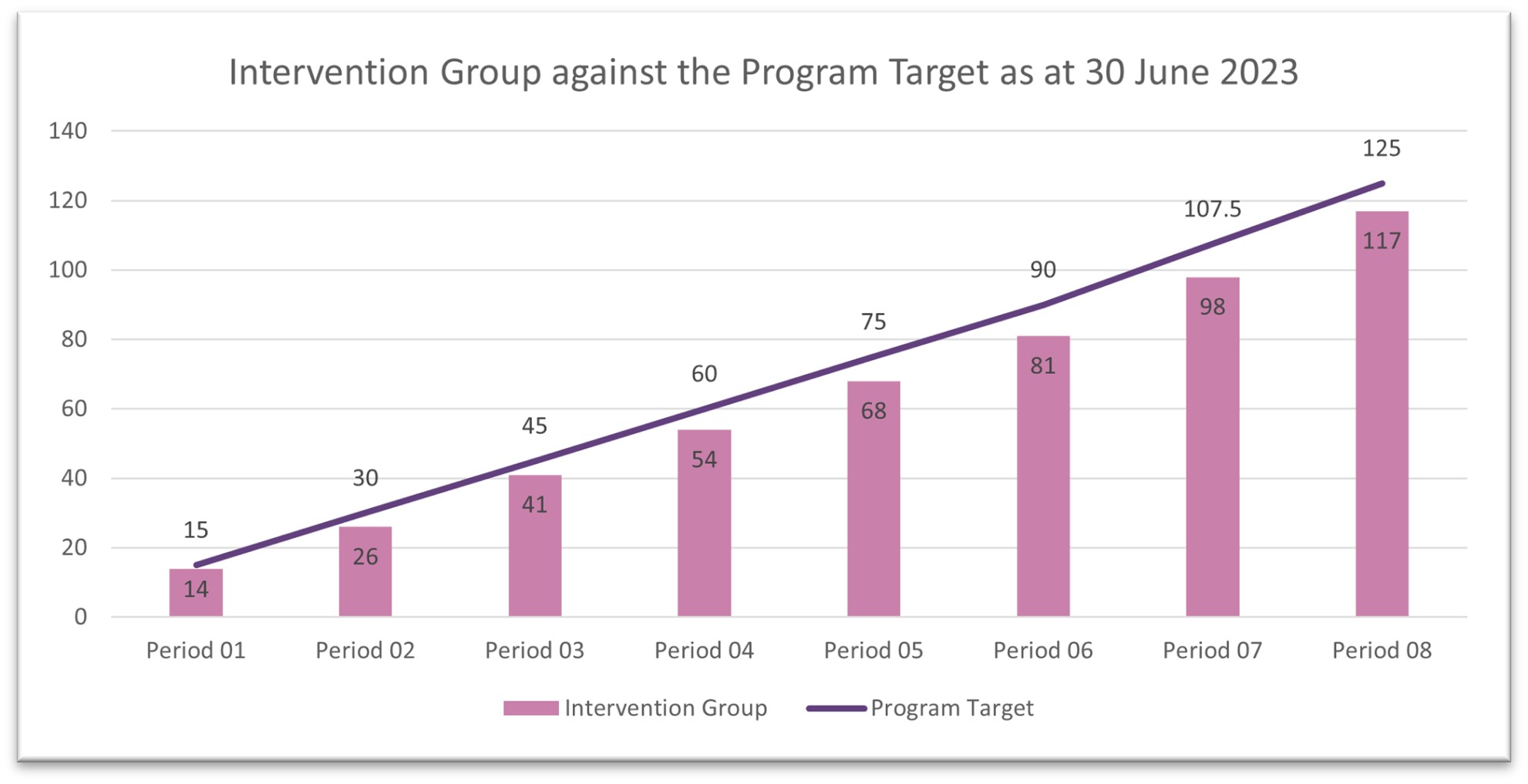
Families were able to be referred to Resilient Families from the inner-south Department for Child Protection (DCP) office from May 2023 due to the above-mentioned changes to DCP office boundaries and structure. The proportion of all referrals from each of the referring DCP offices from 1 July 2022 to 30 June 2023 is shown in Figure 4: Referrals by DCP Referring Office, noting the inclusion of the inner-south DCP office from May 2023. The Benevolent Society (TBS) and DCP have continued to work closely together to identify suitable families for referral and understand the nuances of the service model. At times the demand for services has been higher than the capacity of TBS staff, and the organisations have worked together to understand the options available to families so that the most appropriate support can be offered in a timely manner for families facing a high level of complexity and risk.
DCP and TBS partnered during the reporting period to implement strategies to improve referral processes for the Murray Bridge area to ensure referrals to the program were made within the required timeframes.
Figure 4 Referrals by DCP Referring Office
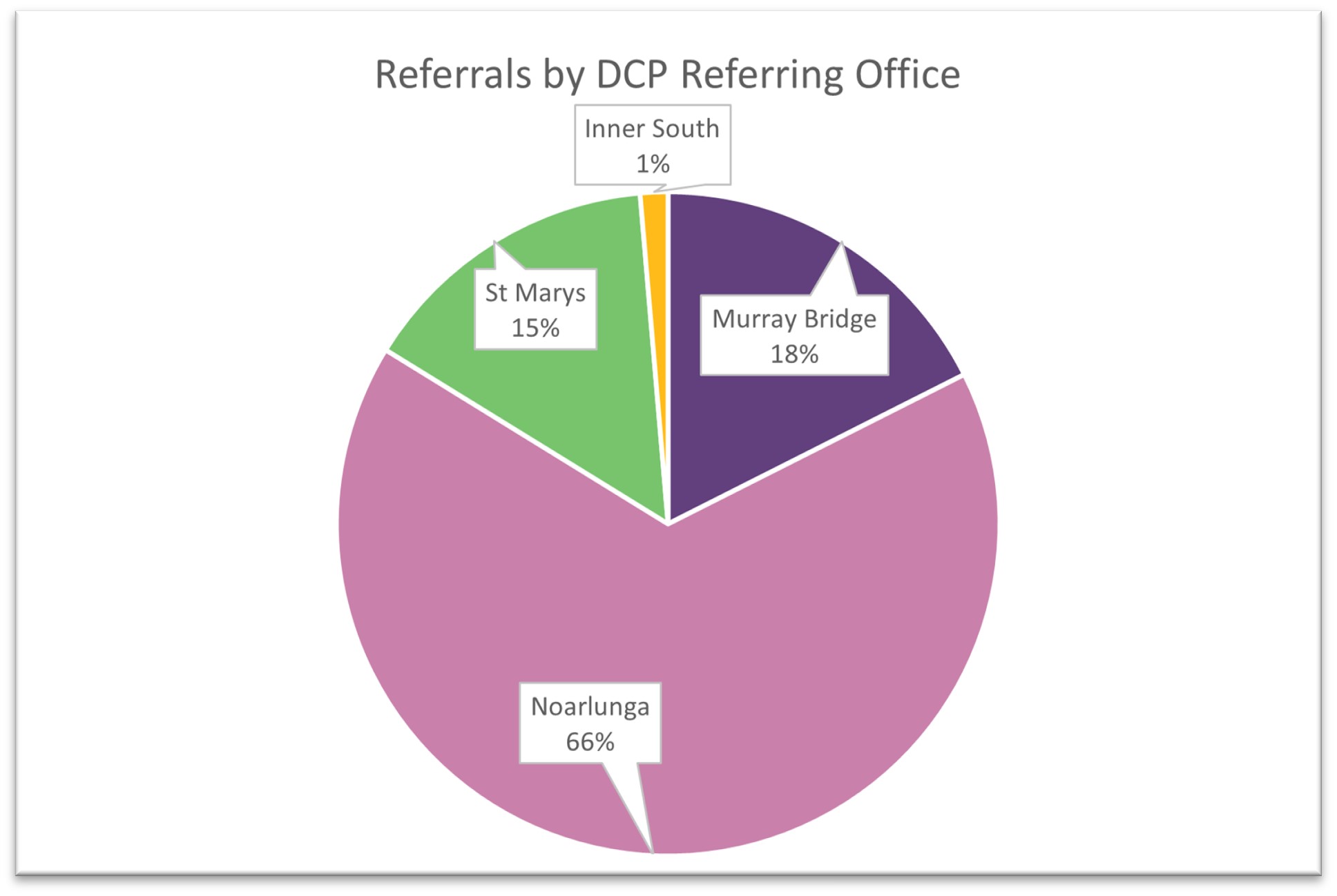
Family demographics
Resilient Families (RF) works with families of all ages, but the Index Child must be less than 9 years of age. The distribution of children’s ages at the time of referral is shown as Figure 5: Ages of Intervention Group, with 6% of the Intervention Group being an unborn baby and 34% aged between 5 and 9 years, for those families referred in the reporting period.
Figure 5 Ages of Intervention Group
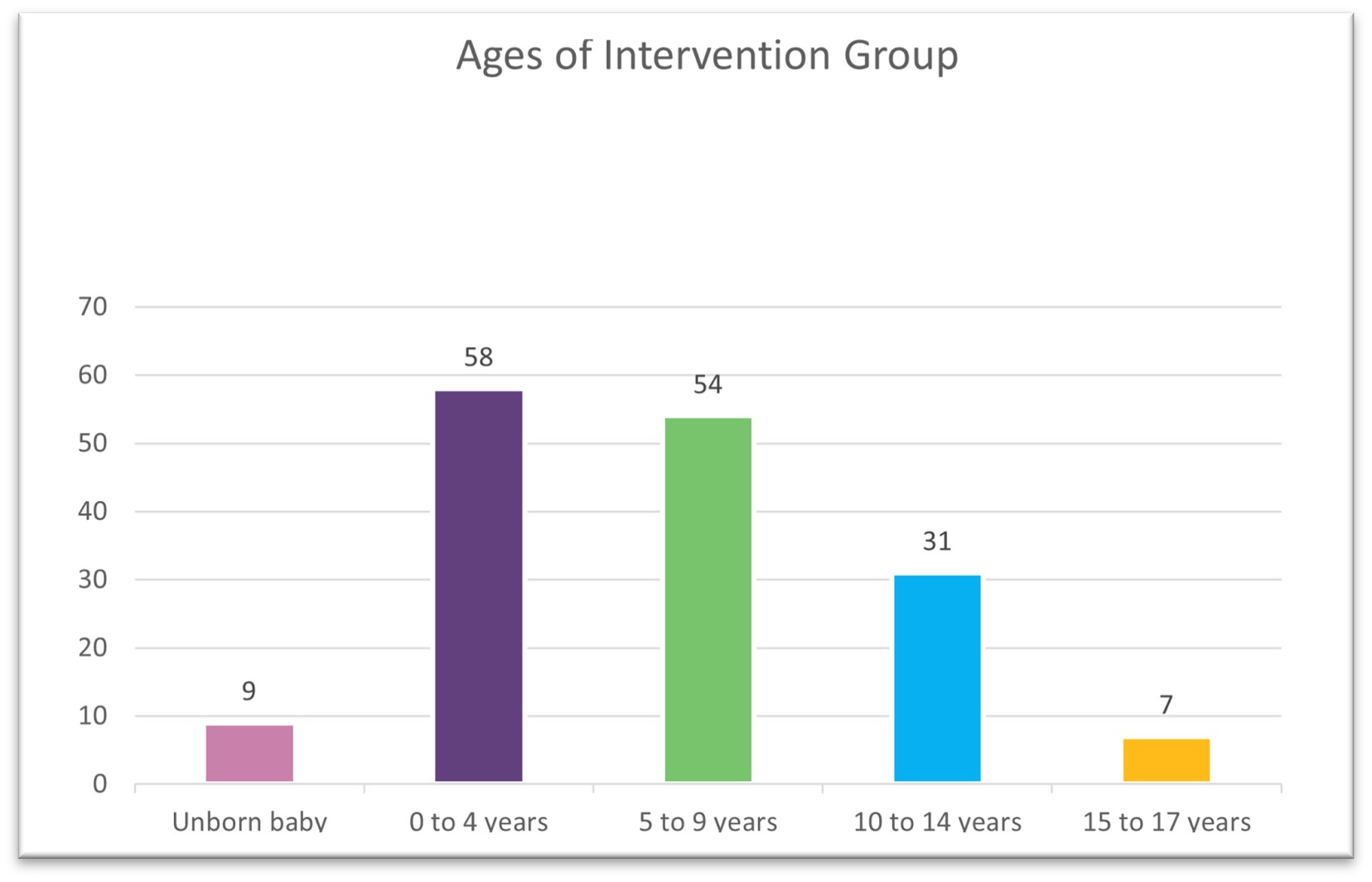
The culture of the families referred and included in the Intervention Group during the reporting period is provided as Figure 6: Aboriginal Families in Intervention Group, with 38% of those families identifying as Aboriginal and/or Torres Strait Islander.
Figure 6 Aboriginal Families in Intervention Group
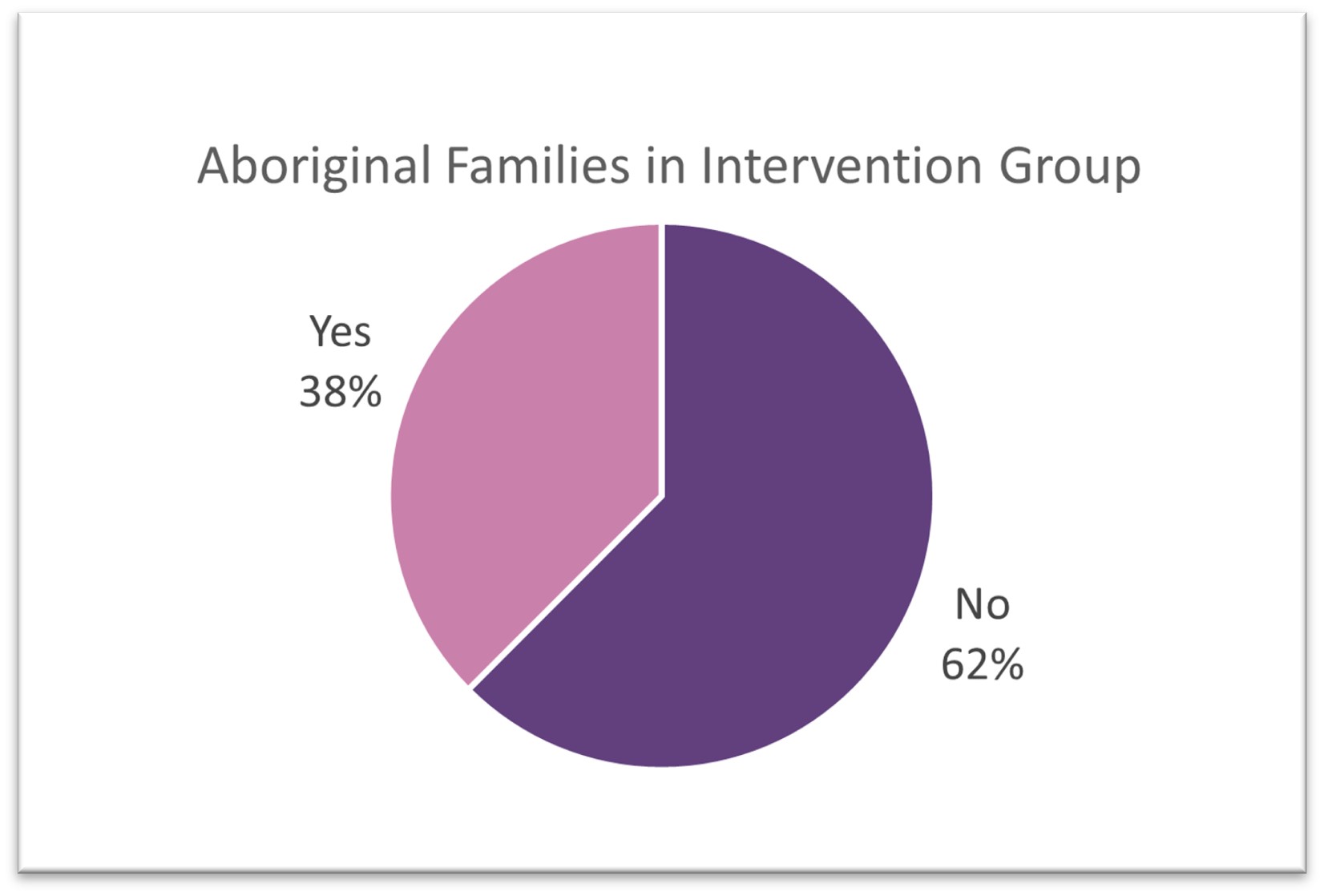
Most of the families in the Intervention Group have more than one child in the household, which is detailed in Figure 7: Number of Children in Household, with the majority of families referred in the reporting period having 2 children in the household.
Figure 7 Number of Children in Household
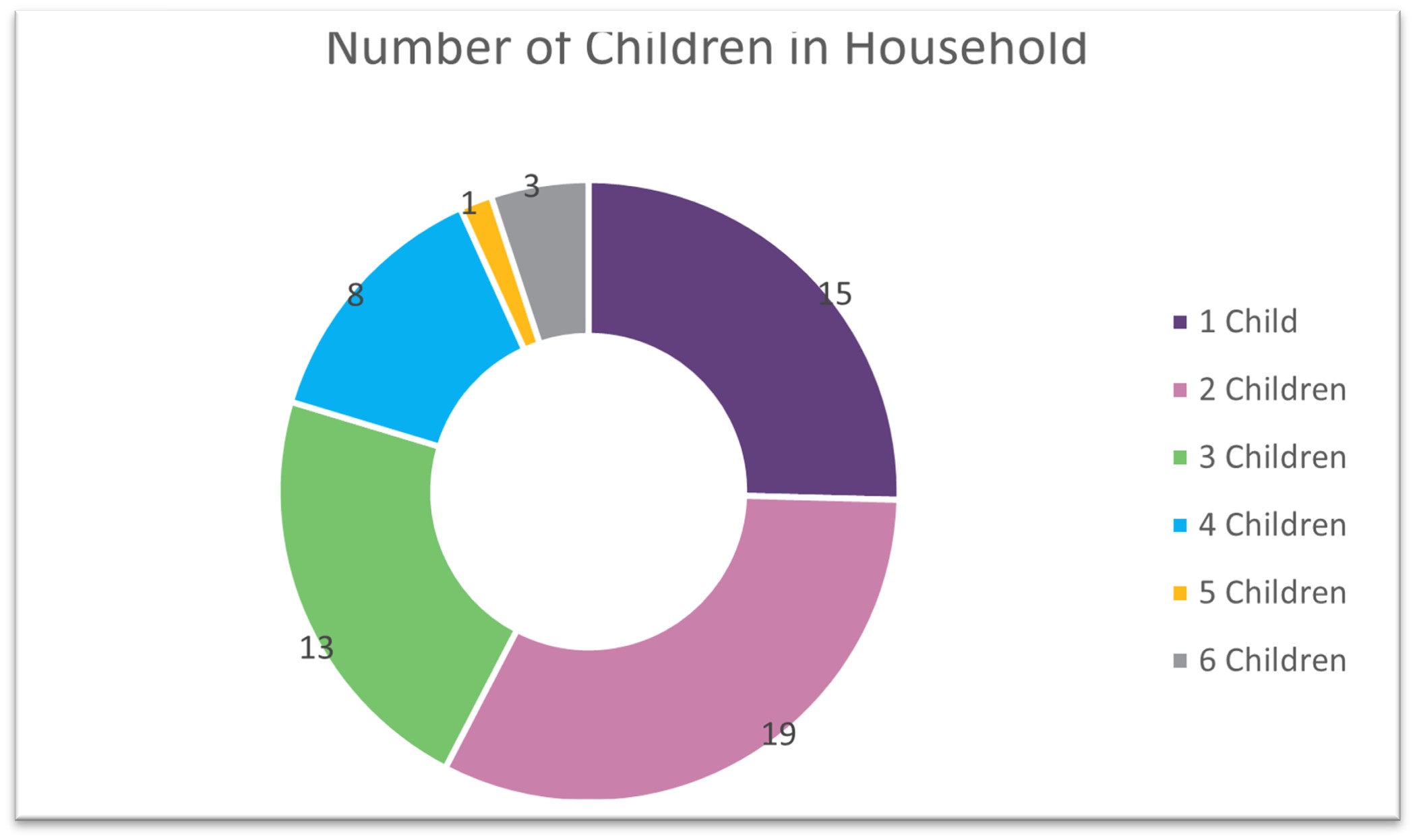
Exclusions
Families may be excluded from Resilient Families (RF) during service provision. Table 2: Summary of excluded families 2022–23 presents the various reasons and number of families excluded for each reason during the reporting period. When a family is excluded, a replacement referral may be requested for an alternative family, as per the rules within the Operations Manual.
Table 2 Summary of Excluded Families 2022-2023
Exclusion code and reason | Count of families | Time period |
|---|---|---|
5.5.1 Ineligible | 6 | Within 4 weeks |
5.5.3 Child placed in to care before engagement | 1 | Within 3 weeks |
5.5.4 Relocation of family | 1 | Within 3 months |
5.5.6 Lack of family engagement | 1 | Within 4 weeks |
5.5.7 Disengagement of family | 6 | After 4 weeks |
5.5.8 Services cannot be delivered | 1 | At any time |
Total | 16 |
A total of 29 families have been excluded from the RF program since commencement, with 16 of these recorded during the 2022–23 reporting period.
All families excluded from the Resilient Families (RF) program are communicated to Department for Child Protection (DCP) so that appropriate escalation or other services can be considered to support the family.
Non-participant families
Families that are excluded from the program due to a withdrawal of their consent are known as non-participant families and excluded under code 5.5.7. As shown in Table 2: Summary of excluded families 2022–23, 5 families were excluded for this reason during the reporting period and further detail on these families and the exclusions is provided in Table 3: Non-Participant Families.
Table 3 Non-Participant Families
Referral Period | Referral Date | Closure Date | Referral ID # | Case Closure Comment |
|---|---|---|---|---|
Period 4 | 16/05/2022 | 9/02/2023 | 15278012 | Ineligible due to suspected abuse, case closed and referred to Child Protection Services and SA Police. |
Period 5 | 4/08/2022 | 2/11/2022 | 16212733 | Family disengaged after 4 weeks. |
Period 5 | 4/08/2022 | 2/06/2023 | 16214725 | Family disengaged after 4 weeks. |
Period 5 | 9/08/2022 | 15/03/2023 | 16320466 | Family disengaged after 4 weeks |
Period 6 | 31/10/2022 | 10/01/2023 | 16841926 | Family withdrew their consent to engage with RF approximately 9 weeks after referral. It is noted the mother in this family has severe mental health issues. |
Period 6 | 1/11/2022 | 26/04/2023 | 16959777 | The family chose to disengage after 4 weeks. They were abusive towards staff and did not want the support. |
All families excluded from the RF program are communicated to DCP so that appropriate escalation or other services can be considered to support the family.
Safety achieved
Families successfully exit Resilient Families (RF) when The Benevolent Society (TBS) determine the safety has been achieved and the high level of support is no longer required. For the purposes of the outcome payments, an assessment of perseveration will be undertaken 12 months after their enrolment date.
During the reporting period, 42 families exited RF having achieved safety. These families were supported for an average of 44 weeks, approximately 10 months. Four
of these families included an unborn child at the time of referral.
Unsuccessful exits
Families unsuccessfully exit RF when the safety concerns for the child/ren are too high and a formal alternative arrangement is implemented, or the family disengages. In the reporting period, 1 of the families engaged with RF had a child placed in care, and 1 family exited without achieving safety.
For families that disengaged from RF (n = 2), the average time spent in the program was 9 months. Comparatively, the NSW Resilient Families program’s ‘disengaged client cohort’ spent an average of 7 months in the program.
Family complexity
Department of Human Services Child and Family Support System (CFSS) Pathways Services completed a Family Complexity profile for all referrals to Resilient Families. The profile considers the presence of 46 factors, which may be a protective or risk factor for that family. The department analyses the Family Complexity data to understand the characteristics of the CFSS population, which includes families referred to Resilient Families.
Table 4 Number of Risk Factors Present
Period 5: | Period 6: | Period 7: | Period 8: | |
|---|---|---|---|---|
Mean number | 19.41 | 20.13 | 16.23 | 16.12 |
Risk factor quartile 1 | 0.0% | 0.0% | 0.0% | 8.3% |
Risk factor quartile 2 | 5.9% | 6.7% | 22.7% | 25.0% |
Risk factor quartile 3 | 23.5% | 20.0% | 45.5% | 16.7% |
Risk factor quartile 4 | 70.6% | 73.3% | 31.8% | 50.0% |
Data extracted and analysed 7 July 2023.
Table 5 Presence of main parental ecological risk factors (Domestic and Family Violence, Mental Health and/or Alcohol and Other Drugs)
Period 5: | Period 6: | Period 7: | Period 8: | |
|---|---|---|---|---|
Zero | 0.0% | 0.0% | 0.0% | 4.2% |
One | 0.0% | 6.7% | 27.3% | 12.5% |
Two | 35.3% | 46.7% | 31.8% | 41.7% |
Three | 64.7% | 46.7% | 40.9% | 41.7% |
Data extracted and analysed 7 July 2023.
Table 6 Number of Protective Factors
Period 5: | Period 6: | Period 7: | Period 8: | |
|---|---|---|---|---|
0 | 41.2% | 33.3% | 72.7% | 58.3% |
1 | 35.3% | 53.3% | 18.2% | 25.0% |
2 or more | 5.9% | 6.7% | 4.5% | 8.3% |
Data extracted and analysed 7 July 2023.
Wellbeing and outcome indicators
The Family Outcomes Tool comprises four standardised measures of wellbeing, mental health, and empowerment, specifically, the: Personal Wellbeing Index (PWI), Parent Empowerment and Efficacy Measure (PEEM), Kessler Psychological Distress Scale (K10, K5), and the Strengths and Difficulties Questionnaire (SDQ). The first three measures are parent-focused, with the latter measure child-focused.
In 2022–23, 141 Family Outcomes Tools were completed with 82 unique families in the Resilient Families (RF) program. Of these outcomes tools, 56 (40%) were completed at initial assessment, 65 (46%) were completed at review, and 20 (14%) were completed at closure of the program. For context, initial assessment outcomes tools are completed within 30 days of referral, review outcomes tools are completed at four monthly intervals during service delivery, and closure outcomes tools are completed when families successfully complete the program with their case plan goals met, or when they otherwise exit the program, where possible.
The outcomes data presented here is limited to matched data, that is, families active in 2022–23 with an initial assessment and at least one follow-up response (review and/or closure), of which there are 57 unique families for this period7. Note that this data includes outcomes data recorded in previous years for these families.
For the 2022–23 financial year, client outcomes were observed across adult wellbeing, child wellbeing, empowerment, and mental health. These are detailed in the sections below.
7 Families that are re-referred may have multiple initial assessments, and all families may have multiple reviews.
Adult wellbeing
Subjective adult wellbeing for parents/carers in RF is measured using the Personal Wellbeing Index (PWI).
For clients active in RF in 2022–23, there was an increase in wellbeing over the assessment period.
At initial assessment, the average PWI score was 67.4 (n = 61), and subsequently increased to 69.5 (n = 83) at review to 75.9 (n=21) at closure. This closure scores sits just above the Australian population average of 75.4<8 and 57% of closure scores were within or above the normative range for Australia.
A primary area of work in RF is focused on the adult’s wellbeing and improving their connection to family, social and community to support a more positive outlook. These increase in PWI scores across the service duration show an increase in the subject adult wellbeing for parents/carers, and is supported by qualitative feedback reported through data collection measures, including:
“My family and relationship is back and we are a family unit again”.
“[I am] feeling lighter, more organised, less stress, clearer thinking, functioning better, having advice and guidance and support on how to help my children and myself.”
8 Crowe, M., Capic, T., Singh, M., Greenwood, C., Frykberg, G., Khor, S., Cummins, R.A., Fuller-Tyszkiewicz, M., Olsson, C.A., Hutchinson, D., Lycett, K. (2023). Australian Unity Wellbeing Index –Survey 39 Report Appendices. Australians’ subjective wellbeing in 2022: Climate change, mental distress, mood and social connection. Geelong: Australian Centre on Quality of Life, School of Psychology, Deakin University. http://www.acqol.com.au/collaborators
Child wellbeing
The Strengths and Difficulties Questionnaire (SDQ) focuses on observable behaviours relating to a child’s socio-emotional wellbeing. It is only administered to parents/caregivers of children aged 2+ years and for this reason there is a smaller sample size for SDQ data. For clients active in 2022–23, the average total difficulty score at initial assessment was 12.4 (n = 30). This increased at review (15.1, n = 46), indicating an increase in observed difficulties over this period.
Reflecting on the improvement in parental wellbeing over this period, it may also be indicative of improved parental engagement and awareness of behaviours relating to
a child’s socio-emotional wellbeing. These difficulties reduced at closure to 11.9 (n=11), indicating an improvement in children’s socio-emotional wellbeing over the full assessment period. The average score at closure is considered “close to average” with 64% of closure scores within this “close to average” range.
Children aged 2 to 4 years at initial assessment had, on average, lower scores at all assessment periods compared to older children (5 to 8 years at initial assessment). Scores decreased from 10.9 (n=17) to 10.3 (n=7) for the younger age group, while scores increased slightly for the older age group from 14.4 (n=13) at initial assessment to 14.8 (n=4) at closure. This finding, while based on relatively small sample sizes, may indicate that younger children referred to RF demonstrate fewer social and emotional wellbeing concerns, compared to those in the older age cohort.
Qualitative data collected from parents/caregivers reflects on some of the changes in their child/ren, and the effect on their wellbeing:
“For [my son] massive change in his behaviour. I can now handle his tantrums and intervene earlier.”
“My child’s happiness and wellbeing has improved.”
Empowerment
Total empowerment is an indicator of parents’ overall feelings of efficacy as measured by the Parent Empowerment and Efficacy Measure (PEEM). Total empowerment increased from initial assessment (155.0, n = 57) to review (157.8, n = 81) and again at closure (167.0, n=21) for clients active in Resilient Families (RF) in 2022—23. At all assessment stages, parental empowerment was higher than the population average (154)9 and 67% of closure responses were at or above the population average.
The PEEM can also be analysed by subscales: Efficacy to parent, which indicates parental confidence, and Efficacy to connect, which is “the degree to which parents feel empowered to access support and to participate in social or other activities that promote positive parenting”.10 At initial assessment, the former sat slightly below average, while the latter was slightly above average. At closure, both sub-scales exceeded the population averages.
These scores, when considered with the child-wellbeing results above may suggest that parents within RF were able to identify and address behaviours relating to a child’s socio-emotional wellbeing.
Practitioners may use the sub-scales to tailor support and focus on the specific needs of each family, with the aim of seeing an improved score across the assessment period.
Reflections from families indicate that RF has improved their confidence and ability to connect, particularly to other support for their children: “It has got better. I feel it is a bit easier to talk to the teachers at school since you guys have been involved. I can talk about the kids’ problems easier with school and doctor.”
9 Freiberg, K., Homel, R., & Branch, S. (2014). The Parent Empowerment and Efficacy Measure (PEEM): A tool for strengthening the accountability and effectiveness of family support services. Australian Social Work, 67, 405-418.
10 https://www.realwell.org.au/peem/
Mental health
Mental health, measured by the Kessler Psychological Distress Scale (K10 and K5), varied between non-Aboriginal and Aboriginal parents. For non-Aboriginal parents, psychological distress (measured by the K10), decreased from an average of 21.9 (n = 45) at initial assessment to 20.5 (n = 59) at review and again to 18.1 (n=18) at closure. This indicates moderate levels of psychological distress at closure, and a reduction in psychological distress over the assessment period. It remains above the Australian population average of 15,11 though 50% of closure responses recorded low levels of psychological distress at closure.
For Aboriginal parents, psychological distress (measured by the K5) increased from initial assessment, 10.3 (n = 16) to review, 11.1 (n = 24). At closure, scores decreased to 9.7 (n=3), noting the small response number. Scores up to 12 indicate low/moderate levels of psychological distress.
Mental health concerns are common risk factors amongst families in Resilient Families (RF) and co-exist with other risk factors such as domestic and family violence and and/or alcohol and other drugs concerns. These findings support the view that mental health concerns are prevalent across all of the RF adult cohort, though there is evidence of improvement across the assessment period. Families have reported through data collection measures that:
“The biggest change in my family is mental health, proper diagnosis and [being] put
on medication.”
“Biggest change has been my mental health, I have increased my coping skills.”
11 Slade, T., Grove, R., & Burgess, P. (2011). Kessler psychological distress scale: normative data from the 2007 Australian National Survey of Mental Health and Wellbeing. Australian and New Zealand Journal of Psychiatry, 45(4), 308–316.
Case study
The Benevolent Society received a referral from Department for Child Protection (DCP) for a family of five: two adults and three school-aged children. The referral concerns were adult mental health, possible undiagnosed disability for one parent affecting parenting capacity, domestic violence, children's health not being attended to and possible global delay and other disabilities for the children, squalor and possible eviction.
During the engagement with Resilient Families, many notifications were made to DCP regarding the children's situation. The Benevolent Society collaborated with DCP and accepted the Refer State Authority (RSA) and worked closely with the family to address the concerns.
The Benevolent Society (TBS) has worked with this family for 12 months and during that period the family increased their safety by improving the condition of the home to be safe for the children and maintained their tenancy with a housing provider. The family has also had several assessments for Attention Deficit Hyperactivity Disorder, global delay, Attention Deficit Disorder and have been able to access NDIS-funded supports.
Resilient Families has worked with its disability team for a seamless service and warm referral. This has enabled services to be delivered in the home, where they were not available previously due to condition of the home and fear from the parents. The coordination of National Disability Insurance Scheme (NDIS) services from a TBS colleague has assisted in maintaining safety and increasing parental capacity. The children are all up to date with any medical checks and dental checks, attend school on a regular basis and engage well with the education system. Resilient Families has worked with the parents to develop a safety plan and support the relationship by addressing the violence with the perpetrator and working within the family to create a change in the power dynamics of the relationship.
The family have become more connected to their community with children attending school, one child playing sport and the mother connecting through a community group, whilst the father is seeking employment.
Shared service goals
During the reporting period, TBS has worked with a PhD student at the University of South Australia to explore parent/caregiver goals of work with family support services and interprofessional practices to support identification and achievement of these goals. This research will provide new insights into shared service goals as an enabler of interprofessional collaboration, including what these shared goals may be, and their role in supporting interprofessional collaboration. It is anticipated the publication of this research will be available for inclusion in the next annual report.
Conclusion
Families within the Child and Family Support System, including participants of Resilient Families, face many complexities, which cannot be addressed through family preservation services only. The Resilient Families Joint Working Group includes members of the South Australian Department of Treasury and Commonwealth Department of Social Services, who provide a connection to other Commonwealth and State services.
Through shared data opportunities, Resilient Families contributes to the understanding of how families interact with services, which can be used to inform future decision-making about services, or how agencies can work together to achieve better outcomes for families. This includes child protection outcomes, the Australian Early Development Census (AEDC), hospital emergency department presentations and inpatient admissions and Commonwealth welfare consumption. Continuing to design and implement improvements to the outcomes for children, young people and families must be evidence-informed so that services deliver the most appropriate support to those who need it. The Government of South Australia continues to also explore opportunities to use shared data to better understand the longer-term outcomes for the families within social impact investment programs.
A further 235 families are hoped to be engaged with Resilient Families over the coming 3.5 years, with the learnings of the program able to continue to evolve the program and hopefully continue the positive outcomes that have been achieved so far.
Acronyms
AEDC
Australian Early Development Census
ADD
Attention deficit disorder
ADHD
Attention deficit hyperactivity disorder
CFSS
Child and Family Support System
CPS
Child Protection Services
DCP
Department for Child Protection (SA)
DHS
Department of Human Services (SA)
DSS
Department of Social Services (Commonwealth)
DTF
Department of Treasury and Finance
EIP
Evidence Informed Practices
EIRD
Early Intervention Research Directorate
K10, K5
Kessler Psychological Distress Scale
NDIS
National Disability Insurance Scheme
PEEM
Parent Empowerment and Efficacy Measure
PhD
A Doctor of Philosophy — the most common degree at the highest academic level, awarded following a course of study and research.
PWI
Personal Wellbeing Index
RF
Resilient Families
RPF
Resilience Practice Framework
RSA
Refer State Authority
SAPOL
South Australia Police
SDQ
Strengths and Difficulties Questionnaire
TBS
The Benevolent Society

